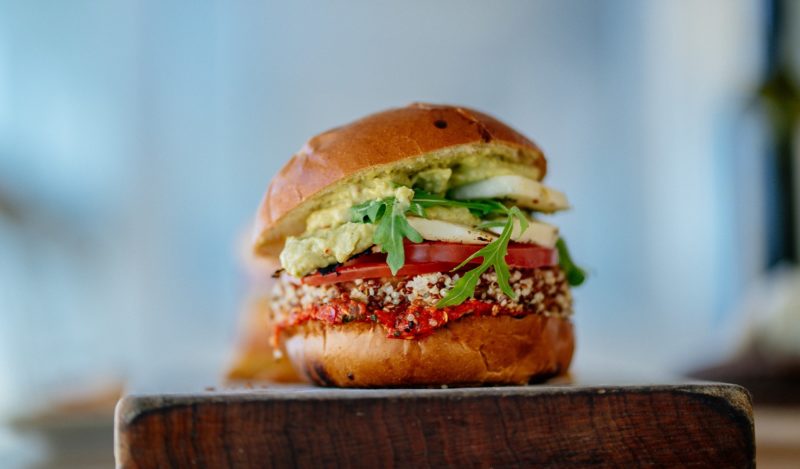March 2020 Bite by Bite: Taking Steps Towards a More Plant-Forward Diet
By Alli Armstrong

Kendall Reagan Nutrition Center encourages you to celebrate healthy eating for March’s National Nutrition Month®. This year’s Nutrition Month theme “Eat Right Bite by Bite” is a reminder that each bite you take is an opportunity to influence your health.
Plant-based meals are growing in popularity as research suggests their positive impact on human health and the environment. Plant foods including fruits, vegetables, nuts, seeds, whole grains, and legumes are a good source of fiber, vitamins, minerals, and other phytochemicals. These nutrients can help prevent—or decrease the complications related to—heart disease, stroke, obesity, high blood pressure, type 2 diabetes, and many cancers. Dietary guidelines recommend eating five (or more!) servings (cup equivalents) of fruits and vegetables per day to help prevent disease, and most Americans eat half that amount.
The good news is that it’s not necessary to eat solely plant-based meals to reap these health benefits. In spirit of “Eat Right Bite By Bite”, any plant-focused meal, snack, or bite is beneficial.
Being “Plant Forward”—the practice of prioritizing plants on the plate—can be a style of cooking and eating that accommodates many different nutritional needs. There are many fast, easy, and delicious ways to incorporate more plants into your diet, and remember, every bite counts!

Action Steps: Start Simple
- Plan out your week to include a meatless meal or two (think Meatless Monday).
- Rather than planning a meal around a meat entree, pick a seasonal vegetable to be the star of your plate. Eggplant Parmesan or stuffed peppers can be hearty meatless dishes.
- Add extra veggies into the meals you already make such as smoothies, dips, pasta dishes, casseroles, soups, tacos, pizza, and sandwiches. Frozen chopped spinach is very versatile and can easily be added into many dishes & smoothies.
- Get creative with healthy fats like avocados, nuts, and seeds by adding them to stir fry, tacos, and sandwiches.
- Mix lentils, beans, chopped mushrooms, soy crumbles, or nuts to displace some meat in dishes like burgers, tacos, or meat sauce.
- Spiralize vegetables to add to a pasta dish. Zucchini, carrots, and beets work well with spaghetti.

Experiment: Add Plant-Based Protein Sources to Your Diet
- Beans and lentils are inexpensive protein sources.
- Nuts provide healthy fats, protein, and fiber to keep you feeling full and energized.
- Soy products like tofu, tempeh, and edamame are versatile meat replacements.
- Whole grains have more protein than refined grains.
Plant-Forward Meal Ideas

- Steel cut oatmeal with walnuts and berries
- Whole wheat avocado toast topped with eggs or seeds (hemp, flax, chia, sunflower)
- Fruit yogurt smoothie bowl with pepitas (pumpkin seeds) and flax granola
- Tofu breakfast scramble with black beans, potatoes, peppers, and tomatoes
- Burrito, burrito bowl or tacos with tempeh, tofu or black beans & fajita veggies
- Whole wheat pita pocket with hummus, feta, and vegetables
- Grain bowls with beans, nuts, and roasted vegetables
- Whole wheat pasta with white bean “meatballs” or tempeh Bolognese
- Lentil soup with spinach and sweet potatoes
- Tofu curry with chickpeas, cashews, and vegetables
- Almond or peanut butter banana sandwich on whole wheat bread
- Fried brown rice with cashews, pineapple, vegetables, tempeh, tofu or shrimp
- Bean nachos or tacos topped with homemade cashew cheese
Get to know our author:
Originally from Boulder, Colorado, Armstrong is a third-year undergraduate student studying Food Science and Nutrition. She is extremely interested in sports nutrition, as well as obesity and community nutrition. When she’s not studying, she teaches yoga at a local studio. Her career plans include combining her passion for yoga and physical activity with empowering others to live their healthiest, happiest lives. Armstrong’s favorite parts of working at the KRNC have been interacting with clients through cooking classes, shadowing the dietitians, and other programs.
More Information
For additional resources to healthy eating, check out these programs from our registered dietitian nutritionists. More health tips are also available at the College of Health and Human Sciences Pinterest board. Lastly, don’t forget to sign up for the KRNC monthly newsletter!


